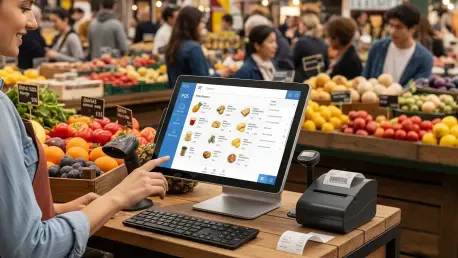The Growing Importance of POS Systems in Today’s Marketplace
Imagine a bustling retail store during the holiday rush, where every second counts, and a slow checkout process could mean losing customers to a competitor. Point-of-sale (POS) systems have become the backbone of such high-stakes environments, ensuring transactions are swift and accurate across industries like retail, hospitality, healthcare, and professional services. These systems are no longer just cash registers; they are integral to managing sales, inventory, and customer interactions in a world where efficiency is paramount.
The digital economy has amplified the need for POS systems as consumer expectations shift toward seamless, technology-driven experiences. Businesses must adapt to demands for quick payments through mobile wallets or contactless methods while also streamlining backend operations to reduce errors and save time. POS technology bridges this gap, offering tools that enhance productivity and ensure transactions meet modern standards of speed and convenience.
Core Payment Solutions stands out as a pivotal player in this space, not only providing cutting-edge payment and merchant technology but also educating businesses on navigating the complexities of adoption. By focusing on tailored solutions, this provider helps companies in diverse sectors understand how POS systems can drive growth and maintain competitiveness in an increasingly digital marketplace.
Key Trends and Market Insights in POS Technology
Emerging Trends Shaping POS Adoption
The POS industry is undergoing a rapid transformation, driven by the surge in digital payment methods such as mobile wallets and contactless cards. Consumers now prioritize speed and ease, pushing businesses to integrate these options into their checkout processes. This shift reflects a broader trend toward cashless transactions, compelling even small enterprises to upgrade their systems to stay relevant.
Beyond payments, POS systems are evolving into all-in-one business management platforms. Features like inventory tracking, real-time sales analytics, and seamless integration with accounting software are becoming standard, allowing businesses to consolidate operations under a single tool. Such advancements reduce manual workloads and provide data-driven insights for strategic planning.
Cloud-based solutions, automation, and artificial intelligence are also reshaping POS capabilities. Cloud technology enables remote access to sales data, while AI enhances functionalities like personalized customer recommendations and predictive inventory needs. These innovations signal a future where POS systems are not just transactional but also proactive in supporting business decisions.
Market Growth and Future Projections
The global POS market currently exceeds a value of $30 billion, with steady growth fueled by relentless technological progress. Adoption rates are climbing as businesses recognize the necessity of integrated systems to handle complex payment ecosystems and deliver superior customer experiences. This expansion is particularly pronounced in sectors where digital transactions dominate.
Looking ahead, market projections indicate sustained growth over the next few years, with demand for secure and versatile POS systems expected to rise significantly. From this year through 2027, analysts anticipate an acceleration in investment as companies prioritize technology that can scale with evolving needs. Security features and compatibility with emerging payment methods will likely remain key drivers.
Consumer behavior will continue to influence market dynamics, with a growing preference for digital-first interactions shaping the direction of POS development. As technology advances, businesses can expect solutions that not only address current challenges but also anticipate future demands, ensuring long-term relevance in a competitive landscape.
Challenges in Implementing POS Systems
Adopting POS technology is not without hurdles, as many businesses grapple with financial constraints when investing in new systems. The initial cost of hardware, software, and installation can be daunting, especially for small enterprises with limited budgets. Additionally, ensuring compatibility with existing infrastructure often poses technical difficulties that delay implementation.
Another significant challenge lies in staff training and adaptation to new systems. Employees accustomed to traditional methods may face a steep learning curve, leading to temporary disruptions in service. This transition period can impact customer satisfaction if not managed with clear guidance and support, highlighting the need for intuitive, user-friendly designs in POS solutions.
Cybersecurity risks further complicate adoption, as POS systems handle sensitive customer data that must be protected against breaches. Robust fraud detection and data encryption are essential to mitigate threats, yet many businesses lack the expertise to evaluate system security effectively. Partnering with trusted providers like Core Payment Solutions can alleviate these concerns by offering tailored support, training, and scalable systems that prioritize safety.
Regulatory and Security Considerations for POS Systems
Navigating the regulatory landscape is a critical aspect of POS system deployment, as compliance with payment security standards and data protection laws is non-negotiable. Businesses must adhere to strict guidelines to safeguard transactions and customer information, a task that becomes increasingly complex with evolving regulations. Failure to comply can result in severe penalties and reputational damage.
Secure transaction processing is at the heart of these requirements, with merchant services integration playing a vital role in maintaining compliance. Such integration ensures that payment systems align with industry standards while offering businesses the flexibility to accept diverse payment methods. This balance between security and functionality is essential for building customer trust.
Regulatory changes and heightened security concerns also influence how businesses select POS providers. Companies are more likely to choose partners with a proven track record of delivering compliant, secure solutions. As threats evolve, the emphasis on robust protection mechanisms will shape purchasing decisions, pushing providers to continuously innovate in this area.
The Future of POS Systems and Industry Innovation
Envisioning the trajectory of POS systems reveals a landscape rich with potential, where emerging technologies like AI-driven analytics and predictive tools will redefine their role. These advancements promise to deliver deeper insights into customer behavior, enabling businesses to tailor offerings with unprecedented precision. Personalization at scale could become a defining feature of next-generation systems.
Market disruptors, including shifting consumer preferences for digital-first experiences and fluctuations in global economic conditions, will test the adaptability of POS technology. Businesses may need to pivot quickly to accommodate new payment trends or economic challenges, placing pressure on providers to offer agile solutions. Staying ahead of these disruptions will be crucial for sustained success.
Core Payment Solutions demonstrates a forward-thinking approach by preparing businesses for such innovations, ensuring that POS systems remain scalable and relevant. By focusing on future-ready technology and comprehensive support, this provider equips clients to navigate uncertainties and capitalize on opportunities, positioning them as leaders in an ever-evolving industry.
Conclusion and Strategic Recommendations
Reflecting on the insights gathered, it becomes evident that POS systems have solidified their place as indispensable tools for operational efficiency and strategic growth in a digital economy. Their ability to streamline transactions and provide actionable data has transformed how businesses operate across diverse sectors. The challenges and opportunities discussed underscore the need for thoughtful adoption strategies.
Moving forward, businesses should prioritize partnerships with knowledgeable providers like Core Payment Solutions to navigate the complexities of technology integration. Exploring customizable, scalable systems that align with specific industry needs is a key step for long-term success. Additionally, investing in staff training and robust cybersecurity measures emerges as critical to ensure smooth transitions and protect valuable data.
As the industry continues to evolve, staying informed about emerging trends and regulatory shifts is essential for maintaining a competitive edge. Businesses that proactively adapt to innovations and consumer demands are best positioned to thrive. Embracing POS technology not only addresses immediate operational needs but also lays a foundation for future growth and resilience in a dynamic marketplace.









